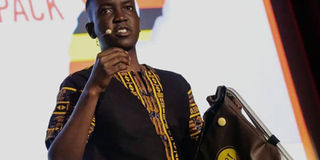After seven failed attempts, he merged a bag and seat

Arnold Mugagga, the inventor of Seat Pack, an innovation that was tailored to address the lack of desks in schools. Mugagga emerged winner out of the 50,000 applicants in the 2018 Total Uganda Startupper Challenge.
Photo by CHRISTINE KASEMIIRE
What you need to know:
Arnold Mugagga, the inventor of Seat Pack, quit his job as an architect to create a school bag which unfolds into a seat and contains a writing pad. Christine Kasemiire finds out what drove the Total Uganda Startupper Challenge winner to design such an innovation.
To say he is too mature for his age would be an understatement. The 26-year old Arnold Mugagga deserves a hero’s medal thanks to his creation that could revolutionalise the education system world over Mugagga, an innovator of seat pack, takes a breath of thought before saying or doing anything.
Whilst watching the news broadcast in 2016, in the midst of friends, Mugagga frowned at how students slept lean in the brown ground class to ensure they could write in their books.
The head boy, in an attempt to topple the system, got a brick on which he sat. It was from there, that the concept of the seat pack was born.
“It was 2016. But how could they could be teaching children in that environment? Would school be appealing to you if you studied in that environment?” he ponders.
His conviction to make a difference soon pushed the architect to quit his job.
“At the time I was working with Studio FH Architects on a contractual basis,” the architect from Nkozi University says.
Seat Pack
At only $30 (Shs112,618), Seat Pack is a 600 gram school bag which unfolds into a seat and contains a writing pad. The innovation was tailored to address the lack of desks in schools.
It is functional for children between six and 12 years. The light pack was designed for the children who have to travel as far as seven miles from home to school and back. When filled to the brim, it weighs less than 1 kg. It was created with conomic, environmental and health sustainability at the back of Mugagga’s mind.
“The weight still keeps the child healthy. In one maneuver, the bag turns into a seat like a stool. We took out the back rest to encourage proper posture,” he says adding: “We limited the pockets so that they carry less. We allowed for a reflector because some of these journeys start early; meaning they should be visible in the dark,” Mugagga explains.
The pack, with a lifeline of about five years, also has an in-built locker function such that once a child sits on it, the books and everything in the bag stays intact.
The seat pack is also made of cloth and ordinary sowing by thread and closes through clippers and tied knots instead of buttons or zippers.
“The waterproof bag ensures that the books don’t get spoilt. We made sure that we do not use any zippers and buttons because they didn’t pass our test. They kept getting spoilt. It has to be usable in the roughest conditions,” he says. He points out refugee settlement camps where some of these things would not be found if needed.
Challenges
To get these details to the dot, Mugagga went through seven failed trials of prototypes. Luckily, the eighth was the charm in 2018. The young man was adamant in this innovation which he says was not only money-draining, but also time consuming. The project cost a little over Shs40m which Mugagga and his partners forked out.
“I would be sleeping and thinking, how do I get this to work? I was doing branding gigs for different companies, different architecture gigs and getting all that money and pumping it into an uncertain deal,” he says.
“But it was frustrating.”
Mugagga also faced doubt and skepticism from other people over the abstract idea.
This experience taught him perseverance, clarity, unwavering faith and exceptional action in the face of failure.
Market
Zetu Africa, the company under which the seat pack project is housed, has partnered with private entities to deliver education for all and sometimes corporate social responsibility to disseminate the bag.
Asked about partnering with Ministry of Education, he says, “Government will find us on the move. We are young we have no access to the structures and decisions of leadership. We have to move. If they are interested, our offices are in this country, they will find us,” Mugagga says.
Winner
Mugagga emerged winner out of the 50,000 applicants in the 2018 Total Uganda Startupper Challenge. During the journey, he was trained.
“We we went from thinking regional to thinking globally,” he says.
He was later taken to Paris where he was one the five Africans showcasing their innovations. While there, another company - VivaTech - in France, invoted him to showcase his innovation. There, Seat Pack was the 18th on a “must see list” of 37 projects at an exhibition with about 13,000 startups.




